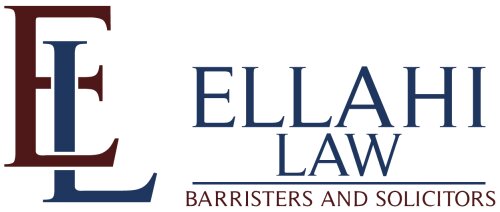Best Project Finance Lawyers in Toronto
Share your needs with us, get contacted by law firms.
Free. Takes 2 min.
List of the best lawyers in Toronto, Canada
About Project Finance Law in Toronto, Canada
Project finance is a specialized area of law focused on the funding and development of large infrastructure and industrial projects, such as energy facilities, transportation networks, real estate developments, and public-private partnerships (P3s). In Toronto, project finance law involves structuring complex deals that distribute risks among multiple stakeholders, including sponsors, lenders, investors, and the public sector. It typically uses a non-recourse or limited recourse financial structure, meaning the project's assets and expected revenue streams serve as collateral for the lending, rather than the general assets of the project sponsors.
Toronto, being Canada’s largest city and a financial hub, is home to significant project finance activity, especially in sectors like transit, green energy, and urban infrastructure. Legal counsel plays a crucial role in ensuring that project finance arrangements comply with Canadian laws and local regulations, protect investors, and facilitate successful project completion.
Why You May Need a Lawyer
Engaging a lawyer with expertise in project finance is often essential due to the complexity, high value, and risk allocation associated with such projects. Common situations where legal help is advisable include:
- Negotiating public-private partnership (P3) agreements with government entities
- Structuring and documenting loan agreements, security packages, or syndicated lending arrangements
- Managing regulatory compliance related to environmental laws, construction codes, or energy regulations
- Drafting and reviewing equity and shareholder agreements among project participants
- Facilitating land acquisition and navigating zoning and permitting requirements
- Resolving disputes among contractors, suppliers, or consortium members
- Advising on tax considerations and incentives for infrastructure projects
Lawyers also assist with risk assessment, ensuring that contractual arrangements appropriately allocate obligations and shield their clients from unnecessary exposure.
Local Laws Overview
Several key legal aspects are relevant to project finance in Toronto and Ontario at large:
- Public-Private Partnerships (P3s) Framework: Toronto relies on detailed P3 agreements, governed by provincial legislation and administered by bodies such as Infrastructure Ontario. These agreements outline responsibilities, financing models, risk sharing, and performance benchmarks.
- Security and Collateral: Canadian law permits various forms of security interests over project assets. The Personal Property Security Act (PPSA) of Ontario outlines how movable and intangible property can be pledged to lenders.
- Environmental and Land Use Regulation: Project sponsors must comply with local, provincial, and federal laws, including the Environmental Assessment Act and municipal zoning by-laws.
- Permitting and Licensing: Major projects require obtaining permits and licenses from city and provincial authorities, which can impact timelines and costs.
- Construction Law: The Construction Act outlines payments, liens, and dispute resolution processes relevant to development projects in Toronto.
- Bankruptcy and Insolvency: Lenders and sponsors must consider the federal Bankruptcy and Insolvency Act and Companies’ Creditors Arrangement Act for structuring projects in a way that protects interests in case of default.
- Taxation: Federal and Ontario tax laws, including provisions for capital cost allowances and GST/HST, impact project financing structures and profits.
Frequently Asked Questions
What is project finance, and how does it differ from traditional corporate finance?
Project finance is a method of funding infrastructure and industrial projects where lenders and investors rely on the project's cash flows and assets for repayment, rather than the general assets or creditworthiness of the sponsors. Traditional corporate finance generally relies on a company’s overall balance sheet.
Who are the typical participants in a project finance transaction in Toronto?
Participants often include project sponsors or developers, lenders (such as banks and institutional investors), public sector partners, contractors, consultants, and sometimes government agencies involved in P3s.
Why is risk allocation important in project finance?
Risk allocation determines how various risks (construction, operational, financial, regulatory) are distributed among parties. Proper risk allocation helps ensure all parties are clear on their responsibilities and financial exposures, making the project more likely to attract financing and be completed successfully.
What role does the government play in project finance in Toronto?
The government often acts as a regulator, permitting authority, landowner, or even financial partner through P3 initiatives. Municipal and provincial agencies may help facilitate projects through funding, guarantees, or regulatory approvals.
What is a limited recourse or non-recourse loan?
In project finance, lenders typically have limited or no recourse to the assets of the project sponsors beyond the project itself. If the project fails, lenders can only claim against the project's assets and revenue streams, not the sponsors' broader assets.
How do environmental regulations impact project finance projects?
Projects in Toronto must comply with strict environmental assessments and permits. Delays or additional costs can arise if environmental risks are not properly managed, which may affect the project's feasibility and financing.
Do project finance agreements need to be reviewed by a lawyer?
Yes, due to the complexity, financial value, and risk involved, legal review is essential to protect parties’ interests and to ensure all documents comply with applicable laws and regulations.
Are there typical industries or sectors where project finance is frequently used in Toronto?
Common sectors include transportation (roads, bridges, transit), utilities (water, wastewater, energy), social infrastructure (hospitals, schools), and large real estate developments. The use of P3s is increasing in these sectors.
How long does it take to structure a project finance transaction?
Timelines can vary widely based on project complexity. It can take several months to a year or more to negotiate, obtain approvals, and close financing for large-scale projects.
Can foreign investors participate in project finance projects in Toronto?
Yes, foreign investors frequently participate. However, they must comply with Canadian laws regarding investment, taxation, and labor as well as any sector-specific restrictions.
Additional Resources
- Infrastructure Ontario: A government agency supporting major public infrastructure projects in the province
- City of Toronto Economic Development and City Planning divisions: Offers information on permitting, land use, and development regulations
- Ontario Ministry of Energy, Northern Development and Mines: Regulates energy projects with financing components
- Canadian Bar Association (Ontario Branch): Provides directories for finding legal professionals experienced in project finance
- Construction and Design Alliance of Ontario: Offers resources on construction law and industry best practices
- Toronto Public Library Business and Legal Resources: Access to legal forms, guides, and literature on project finance
Next Steps
If you are planning to participate in or finance an infrastructure or industrial development in Toronto, consider taking the following steps:
- Identify the nature and stage of your project, including stakeholders and funding sources
- Gather all relevant documentation, such as business plans, permits, and preliminary agreements
- Contact a law firm or legal professional with experience in project finance or infrastructure law in Toronto - they can perform risk assessments and advise on legal structure
- Arrange for preliminary consultations to outline objectives, challenges, and timelines
- Stay informed of regulatory changes in Ontario and Toronto that may impact your project
- Engage with governmental bodies early to secure necessary approvals and establish regulatory relationships
Securing knowledgeable legal support from the outset increases the likelihood that your project will be financed, built, and operated successfully while complying fully with all relevant laws and regulations.
Lawzana helps you find the best lawyers and law firms in Toronto through a curated and pre-screened list of qualified legal professionals. Our platform offers rankings and detailed profiles of attorneys and law firms, allowing you to compare based on practice areas, including Project Finance, experience, and client feedback.
Each profile includes a description of the firm's areas of practice, client reviews, team members and partners, year of establishment, spoken languages, office locations, contact information, social media presence, and any published articles or resources. Most firms on our platform speak English and are experienced in both local and international legal matters.
Get a quote from top-rated law firms in Toronto, Canada — quickly, securely, and without unnecessary hassle.
Disclaimer:
The information provided on this page is for general informational purposes only and does not constitute legal advice. While we strive to ensure the accuracy and relevance of the content, legal information may change over time, and interpretations of the law can vary. You should always consult with a qualified legal professional for advice specific to your situation.
We disclaim all liability for actions taken or not taken based on the content of this page. If you believe any information is incorrect or outdated, please contact us, and we will review and update it where appropriate.

















